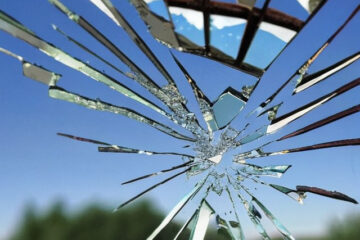by Melanie Gruenwald
The other day, my husband, Salomon, asked me to pick up some new drinking glasses for our kitchen. Somehow our collection from the past 22 years of marriage has diminished due to lots of “oops moments,” and my 16- year-old son’s habit of hoarding glasses in his bedroom.
I bought a set of six glasses from Target, and we started loading them in the dishwasher together before we put them to use. As Salomon created space on the top shelf by moving other items around, I loaded the glasses, like pieces in a puzzle, so we could fit all of the glasses in our almost-full dishwasher.
Salomon pulled a small plate off the top shelf, I put a glass in, our hands and items collided, and…. a new glass was already broken. We paused and looked at one another, knowing it was just an accident. We took deep breaths.
The irony of breaking a glass together was not lost on us.
A custom in Jewish weddings is to end the ceremony with a stomp on a glass, shattering it into irreparable pieces. This broken glass ritual represents recognition of the brokenness in the world, while we are in the midst of a joyous celebration. It is symbolic of the destruction of the Temple in Israel- and the also reflects the transformation of the couple, transforming through the wedding rituals into a new shared identity and status in community. They can never go back to how they were before. Through the breaking, the newly married couple is also creating.
We’ve experienced so many shattered moments in the weeks, months and years since we have been married. Some of them personal- cancer diagnoses, the death of a child, facing the unknown. Life transitions. Some of them communal and global—like the pandemic, the war in Israel, and the ongoing loss of life in wars and crises around the world.
Are the shattering of the vessels an inevitable part of human existence? Kabbalist Isaac Luria transformed the way we think about creation centuries ago– Creation started with a shattering, and our purpose here is to gather the shards and create light and healing.
The brokenness comes before the wholeness. Over and over again.
The pieces never exactly replicate the whole from which they came. There will always be splinters missing, mismatched parts, misaligned edges. Our work is endless. To collect, to heal and to reflect.
And isn’t it interesting, the broken shard with the most edges, reflects the most beautiful light?
Perhaps as we witness and experience the brokenness of the world, and the shattering happening around us, we can stand in awe of the delicate shards, hold them with curiosity and wonder, and do the work to piece them back together. In all of this brokenness, there is much work to be done.
Learn more about Isaac Luria and Kabbalah with our Level I classes at Kabbalah Experience









0 Comments